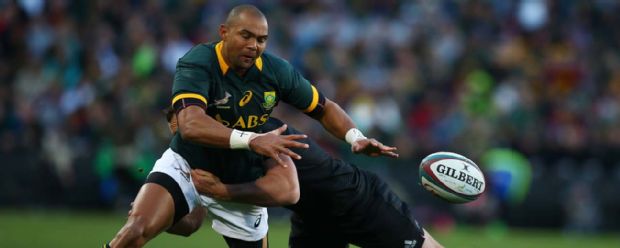|
IRB Rugby World Cup
Meyer must carry can for Boks' lack of conditioning
John Mitchell
July 27, 2015
 Cornal Hendricks© (Photo by Steve Haag/Gallo Images/Getty Images) For a second consecutive week, the Springboks were unable to close out a Rugby Championship encounter, which calls into question physical and mental conditioning. In the buildup to the Ellis Park Test, Springbok coach Heyneke Meyer said that his side weren't yet fit enough to win the World Cup. On Saturday, we saw that the Springboks definitely aren't as physically fit as the All Blacks. While the South African system, which sees the Super Rugby franchises control the players for most of the year, doesn't help Meyer, the experienced coach knows the system and needs to take responsibility for it. From what I've heard, when the Springboks assembled two weeks before the Rugby Championship began, it was the first time they had done fitness testing during Meyer's tenure, which is ludicrous. All strength and conditioning needs to be aligned to the style of rugby played. Players should be held accountable for their fitness throughout the season to aspire, achieve and set standards. Meyer aims to focus on the players' conditioning over the next month or so, but it may already be too late as far as the World Cup is concerned. In terms of mental conditioning, the Boks lack belief. Do not be fooled by talk, as belief comes from the deposits of winning often in matches and championships that matter. This was evident too when the Springboks and All Blacks met at Ellis Park in 2013 and 2014. On the positive side, the Springboks' change of mindset in terms of catch and pass, tip on from the forwards, switches and inside balls helped them put pressure on the All Blacks. The home side created a lot more attacking opportunities. They beat 28 defenders and made 10 clean breaks. In comparison, the All Blacks beat 19 defenders and made seven clean breaks. It was interesting to see that both teams scored tries, through Jesse Kriel and Dane Coles respectively, from the under-running line. By that, I mean they came underneath the defence. We might see more of said approach at the World Cup. With defences standing up a lot more in full-field formation, it makes sense for teams to run that brave line at full pace. It puts responsibility on the inside tackler, and if he's upright like Ma'a Nonu and Kriel were, he will be exposed. Likewise, it forces the outside defender to react and close. However, when they are too late or square, they cannot come forward with their shoulders on. It was unfortunate that the match went to uncontested scrums after both of South Africa's designated tightheads, Jannie du Plessis and Vincent Koch, had left the field. It was technically the correct decision by the officials, as they were following World Rugby protocol. However, Bok loosehead prop Trevor Nyakane can play tighthead, so there was no safety issue. I believe it's a rule World Rugby need to amend before the World Cup. Match-day squads were increased from 22 to 23 so that there could be another prop on the bench to avoid the game going to uncontested scrums, yet that is what transpired on Saturday. The Boks dominated the breakdown, with several players forcing turnovers on the ground. A lot of eyes were on openside flank Heinrich Brussow, who played his first Test since the 2011 World Cup. Brussow played his part, but didn't have a huge influence on the game. Marcell Coetzee remains a better all-round option for the Boks. Brussow didn't carry the ball much, and Bismarck du Plessis and Schalk Burger made a bigger impact at the tackle area. I felt the All Blacks were poor at ruck time in clean out past the ball. They lost their feet a lot in tackle breakdown and ended up with congested savings by the first three defenders. Their forward pack is ageing, with Owen Franks and Tony Woodcock caught out defensively outwide, while, James Broadhurst endured a very difficult introduction to Test rugby. Lima Sapoaga enjoyed a fine Test debut at flyhalf, but the All Blacks still missed Dan Carter's influence. Sapoaga's short restarts weren't as accurate as Carter's had been against Argentina, which made it easier for South Africa to secure possession in Johannesburg. Meanwhile, in Mendoza, it took the Wallabies a while to gain ascendancy over Argentina. The Pumas' scrum strength was again evident, but their exit kicking and decision-making in their own half let them down. A poor exit kick went straight down Israel Folau's throat; the Wallabies counter-attacked and scored a try courtesy of Joe Tomane in the 17th minute. Matt Toomua's injury saw Quade Cooper come on at inside centre, but the Reds playmaker goes across the defensive line a lot, and I believe he will get cleaned up by better defensive teams. David Pocock and Michael Hooper were quite influential when they played together. The pair applied a lot of pressure at the breakdown and kept the ball moving well. Meanwhile, replacement Scott Sio seemed to solidify the Australian scrum. This Saturday's title decider in Sydney means little in terms of the World Cup. A win against the All Blacks would boost the Wallabies' confidence, but confidence is not really something Australian teams struggle with even if they win one out of 10 Tests against the All Blacks. © John Mitchell
|
Live Sports
Communication error please reload the page.
-
Football
-
Cricket
-
Rugby
-
- Days
- Hrs
- Mins
- Secs
F1 - Abu Dhabi GP
Abu Dhabi Grand Prix December 11-131. Max Verstappen ()
2. Valtteri Bottas (Mercedes)
3. Lewis Hamilton (Mercedes)
4. Alexander Albon ()
5. Lando Norris ()
6. Carlos Sainz Jr ()
-
ESPNOtherLive >>
Boxing - Nelson v Wilson; Simmons v Dickinson; Joshua v Gavern (Metro Radio Arena, Newcastle)
Golf - Houston Open
Snooker - China Open
Tennis - Miami Open

